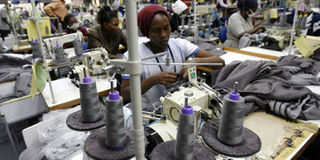We need more perspiration than inspiration to turn Kenya around

Kenyan workers prepare clothes for export at the Alltex export processing zone factory in Athi River, near Nairobi on July 31, 2009. PHOTO | REUTERS
What you need to know:
- Kenyans today, who are seeking 99 per cent inspiration and one per cent perspiration – whom I shall call the 99ners.
- The first lot will be found in churches, where gullible believers are persuaded to plant “seed” with the pastors, so that from such seed shall come an abundance of fruit.
- The second lot includes dreamers and sometimes entrepreneurs who have excellent visions and ideas of doing business.
- A third lot is that of rich individuals whose source of income and wealth remains mysterious.
- The fourth lot is those individuals who do nothing but believe their siblings, parents, and relatives owe them a living.
Recently a friend remarked to a group of us that Kenyans love inspiration but are not too hot on perspiration.
This, of course, comes from the saying that success is one per cent inspiration and 99 per cent perspiration. The true meaning of this saying seems lost to many Kenyans today, who are seeking 99 per cent inspiration and one per cent perspiration – whom I shall call the 99ners.
If you had doubt on the abundance of 99ners in our society, please take the time to observe them in action. The first lot will be found in churches, where gullible believers are persuaded to plant “seed” with the pastors, so that from such seed shall come an abundance of fruit.
Of course, the fruit comes in the form of palatial homes, top-of-the-range cars, and business class air travel for the pastors, but the poor “seed” planters mostly seem to come up empty handed.
However, they continue to be encouraged by the fruit-eaters to keep planting more seed so that one day, they too may achieve their “breakthrough”.
The second lot includes the various dreamers and sometimes entrepreneurs who have excellent visions and ideas of doing business.
They are excellent at thinking up new things and new ways of doing the obvious, but are unable to turn these into a proper business that actually makes money.
Among this lot are our budding information technology startups that constantly burst on to the scene with new apps and technologies, but rarely become a going business.
The reasons may be many. We have few angel or venture capitalists, our markets are small and our people think local rather than glocal, and we have few mentors to help these mainly young people succeed. But I suspect the greatest impediment to growth for these great ideas is the geniuses behind the mistake making the app or technology for the 99 per cent, instead of the 1 per cent achievement that really is.
RICH INDIVIDUALS
A third lot is that of rich individuals whose source of income and wealth remains mysterious.
Typically, they have no specific businesses or farms they own and run, do not seem to have shares in any public or private companies, or any investments one can put their finger on.
Some are associated with corruption, others are said to dabble in unmentionable enterprises, while others still are said to be beneficiaries of diabolic oaths and practices – the converse of the seed planters in their choice of deities and spirits. This is the only lot of the three that has loads of money to dish around.
The fourth lot is those individuals who do nothing but believe their siblings, parents, and relatives owe them a living.
They blame everything, tribe, gender, race, religion, and even deities for the fact that they don’t seem able to get or keep jobs.
Despite this small fact, they expect to live their full life on other people’s money, and carry themselves with a strong element of entitlement to a good life at other people’s expense. Then we have the thieves and robbers, beggars, and all other elements of our society that want to live on other’s earnings.
The main concern is that we seem to have taken up a culture that seems to prefer these 99ners and see them as smarter than folks who believe in sweating for their livelihood.
The hardworking people in all walks are looked down upon as not being “very smart” because the fruits of their honest labour look modest compared to that obtained by our 99ners. They are mocked and laughed at, while the 99ners become the socialites, opinion leaders, and even political leaders.
We need, as Kenyans, to ask ourselves a very basic question – why would anyone, or any society, want to admire or imitate such folks, and yet we all know or are supposed to know there is no lasting or true success without hard work.
One wonders how we can admire and aspire to become like Singapore, Japan, South Korea, or even America and Europe, without realising that those countries, their chequered histories taken into account, are largely built on cultures that prize enterprise, thrift, and hard work.
Indeed, there are no known short-cuts to becoming a developed country, and the values we are beginning to admire and adopt cannot become the foundation and roadmap to national economic and social prosperity.
In fact, if one looks at our key challenges – corruption, insecurity, poverty, ethnicity, and unemployment – Kenya will need to go back to its initial motto of Uhuru na Kazi.
Liberty will spark the one per cent inspiration to solve these problems by identifying the so-called “killer apps”, followed by 99 per cent perspiration in the form of focused, tenacious and disciplined striving over the next three to four decades to transform our country into a world class country.
Mwale is a commentator on public policy issues




